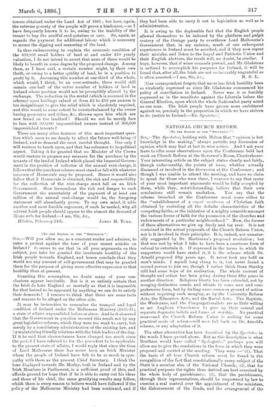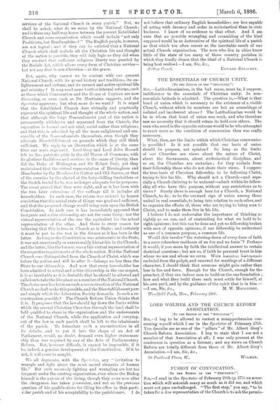NATIONAL CHURCH REFORM. rTo THE EDITOR OF THE " SPECTATOR
.1 SIR,—The Spectator, holding with Milton that "opinion is but knowledge in the making," always permits any discussion of opinion which may lead at last to wise action. And I ask your leave to offer some observations upon the Conference held last week on Church Reform at the Governor's Room, Charterhouse. Your interesting article on the subject states clearly and fairly, though unfavourably, the points at issue, whether actually discussed or involved in the discussion at the Conference ; and though I was unable to attend the meeting, and have no claim to speak for those who were there, I venture to say that many of your most important arguments would be fully accepted by them, while they, notwithstanding, believe that their own
conclusions still remain unshaken. You say that the scheme broached at the Conference must come either to the "establishment of a caput wzortuunt of Christian faith obtained by excluding all the definite characteristics of the competing faiths, or the initiation of a mighty scramble amongst the various forms of faith for the possession of the churches and endowments of a particular neighbourhood." Now, the former of these alternatives we give up freely and for ever. It is not contained in the actual proposals of the Church Reform Union, nor is it involved in their principles. It is, indeed, not unnatur- ally suggested by Dr. Martineau's proposed resolution ; but that was met by what I take to have been a courteous form of refusal to entertain it. If expressed in the terms in which its supporters would have stated it, it is the scheme which Dr. Arnold proposed fifty years ago. It never took any bold on men's minds. I myself long clung to it, but never found a second person to join me, though I rather think Dean Stanley still had some hope of its realisation. The whole current of thought and action has been going during these fifty years in another direction. Religious liberty has been extended, not by merging distinctive creeds and rituals in some new and com- prehensive form, but by finding some common ground of action without requiring such merging, as by the University Reform Acts, the Education Acts, and the Burial Acts. The Baptists, the Wesleyans, and the Congregationalists are as little willing as are Anglican Churchmen to give up their several and separate dogmatic beliefs and farms of worship. No practical man—and the Church Reform Union is seeking for some practical mode of action—will now fall back on Dr. Arnold's scheme, or any adaptation of it.
The other alternative has been described by the Spectator in the words I have quoted above. But as this description is what Bentham would have called " dyslogistic," perhaps you will allow me to give tha resolutions in the form in which they were proposed and carried at the meeting. They were :—" (1), That the basis of all true Church reform must be found in the recognition of the fact that constitutionally every subject of the State is a member also of the National Church ; (2), that for practical purposes the rights thus derived are best exercised by the whole body of parishioners; (3), that the parishioners, through their representatives, should be empowered by law to exercise a real control over the appointment of the ministers, the disbursement of the funds, and the arrangement of the services of the National Church in every parish." But, we shall be asked, what do we mean by the National Church ; and is there any half-way house between the present Established Church and some organi.ation which would include "not only Positivists, but Bradlanghites ? " The English people, however, are not logical ; and if they can be satisfied that a National Church which shall include all the Christian life and thought of the nation is possible, they will defy logic as they did when they resolved that sufficient religious liberty was granted by the Burials Act, which allows every form of Christian service— but not any that is non-Christian—at the grave.
But, again, why cannot we be content with our present National Church, with its grand history and traditions, its en- lightenment and culture, and its earnest and active spiritual life and ministry ? It may need some further internal reforms, such as those which Convocation and the House of Laymen are now discussing, or even such as Dr. Martineau suggests, and the Spectator approves ; but what more do we want ? It is urged that the Established Church does virtually and practically represent the spiritual life and thought of the whole nation, and that although the large Nonconformist part of the nation is permanently withdrawn and separated from the Church, the separation is formal and not vital, social rather than religious; and that this is admitted by all the more enlightened and rea- sonable of the Nonconformists themselves, even though they advocate Disestablishment on grounds which they still think sufficient. We reply by an illustration which is at the same time our main argument. Lord Grey and Lord John Russell felt no less patriotic pride in the old House of Commons, with its glorious traditions and services in the cause of liberty, than did the Duke of Wellington and Sir Robert Peel ; yet they maintained that the virtual representation of Birmingham and Manchester by the Members for Gatton and Old Sarum, or that of the counties by the elected of the forty-shilling freeholders or the Scotch feudal lords, was no longer adequate for its purposes. The event proved that they were right, and so it has been with the two later extensious cf the suffrage till it includes all householders. In each case, the reform was resisted by honest conviction that the actual state of things was good and sufficient, and that the proposed change would bring ruin upon the British Constitution. In each case it has immediately appeared that inorganic and active citizenship are not the same thing ; nor the virtual representation of the one the equivalent for the actual representation of the other. And there is every reason for believing that this is true in Church as in State ; and certainly it must be put to the test in the former as it has been in the latter. As long as the Constitution was aristocratic in the State, it was not unnaturally or unreasonably hierarchic in the Church ; and the latter, like the former, was a fair virtual representation of the respective requirements of the whole nation. Bat the National Church—as distinguished from the Church of Christ, which was before the nation and will be after it—belongs no less than the State to our citizenship. And now that every householder has been admitted to actual and active citizenship in the one respect, it is as inevitable as it is desirable that he should be allowed and called on to take the like place as a member of the National Church. The choice now lies between such a reconstruction of the National Church as shall make this possible, and the Disestablishment pure and simple which the Liberation Society demands. Is such a re- construction possible ? The Church Reform Union thinks that it is. It proposes that the law should lay down the limits within which the several Christian Churches through the land shall be held qualified to share in the organisation and the endowments of the National Church, while the application and carrying. out of the law in each parish shall be left to the inhabitants of the parish. To formulate such a reconstruction in all its details, and to put it into the shape of an Act of Parliament, would, no doubt, demand even higher statesman- ship than was required by any of the Acts of Parliamentary Reform. But, however difficult, it cannot be impossible, if it be, indeed, a genuine development of the Constitution. If it be not, it will come to nought.
We all deprecate, with the Spectator, any "invitation to wrangle and fight about the most sacred elements of human life." But such unseemly fighting and wrangling are but too frequent under the existing organisation, even where the Bishop himself is the patron of the living, though they come now after the clergyman has taken p3ssession, and not on the previous question of his qualific ttions for filling his office in that parti- e alar parish and of his acceptability to the parishioners. I do
not believe that ordinary English householders are less capable of acting with decency and order in ecclesiastical than in civic business. I know of no evidence to that effect. And I am sure that no possible wrangling and scrambling of the kind supposed would be so destructive of the spiritual life of a parish as that which too often occurs as the inevitable result of our actual Church organisation. The men who live in cities know little of the state of too many of those country parishes in which they fondly dream that the ideal of a National Church is being best realised.—I am, Sir, &c.,



































 Previous page
Previous page